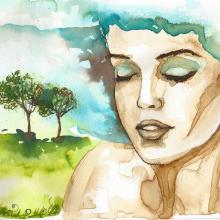mother earth
IN RATTLING THOSE DRY BONES: Women Changing the Church, activist and author Susan Cole writes an essay in response to the question, Why do I remain in the church? In her answer, she shares how she healed her relationship with God through the figure of Sophia, who she defines as “the Wisdom of God, the divine imaged as female.” Cole writes, “Through [Sophia] I have discovered in a whole new way, divine presence within myself, within my sisters, within all that is.” Cole’s portrait of a female God, filled with kindness and joy, stands in stark contrast to the millennia of androcentrism that shapes Christian teaching and practice. The treasure of the Christian female godhead remains buried, but it can be uncovered.
Sophia sits (metaphorically) at artist Judy Chicago’s “The Dinner Party,” the famed feminist installation anchored by an enormous triangular banquet table, 48 feet long on each side. From 1974 to 1979, Chicago scrupulously created unique, historically precise place settings for 39 “guests of honor,” female figures both mythical and historical, ranging from Mother Earth to Georgia O’Keeffe. An additional 999 names appear written on tiles surrounding the table. According to Brooklyn Museum curators, at Chicago’s table Sophia stands as a powerful “creative force in the universe” and a cross-cultural symbol of a female God. And the elements of Sophia’s place setting — a flower plate with watery petals and a runner made from remnants of a wedding veil — symbolize Christianity’s role in “the downfall of female power, particularly religious power.” On a grand scale, “The Dinner Party” reminds us of what patriarchy has erased.
Saint Francis praying to sister moon and brother sun has changed me. I must confess I am going through a conversion, yet another one. But this time much bigger than I could imagine. I have begun listening to the birds. I have started paying attention to the rivers. I have stopped to talk to trees. As a city boy who grew up in the dirty streets of Sao Paulo, I am becoming closer to the pulsing heart of forests, animals, rocks and skies, and it has expanded my allegiance to God.
Today, many of you will remember to celebrate me, learning or teaching your children about the importance of reducing waste and recycling, conserving energy, or keeping my land, air, and water clean. I truly appreciate the efforts you make for a struggling old lady for whom such acts of consideration bring rays of hope. As you know, my health has been deteriorating rapidly of late, and I struggle to care for all 7 billion of you as I would like. I long to give you sweet, fresh air to breathe, clean water for drinking and bathing, fertile soil for growing food, majestic mountains to revitalize your souls, and much, much more. But I am not the girl I used to be, and much of what I had to give in my youth has been spent faster than I ever could have imagined. So please accept this letter as an expression of my affection; I wish I had more to give.
I am reaching out to you, my children, because I know you love me and I know you need me. Some of you try hard to care for me and nurse me back to health. I value all of your efforts. But there is something I need from all of you that is far too often overlooked when it comes to the care I need to survive. For the truth is, I am dying. Your Father cares for me but has also entrusted me to your care, and thus my hope for a future lies in you. So I am pleading with you, my children, to remember me and remember our need for each other. And I have an urgent request of all of you that could perhaps do more to revitalize my health than anything else you could do, though I rarely hear it mentioned:
Stop killing each other!
When God coupled the earth with the breath of eternity, our souls and the soil were fused and our destinies perpetually intertwined. While many of us have been taught that human beings have dominion over the Earth, we have not understood that what we do to Mother Earth, we do to one another and to God.
Dominion theology has led to domination, abuse, and destruction of Mother Earth and human communities. Every time we strip the land of its diversity, we strip a layer of humanity from our collective souls. Soil is also a community of diverse beings — some visible to the naked eye, some microscopic. A diversity of beings distinguish fertile soil from lifeless dirt. When industrial agriculture or chemical spills make these beings homeless, our soil becomes dust and is gone with the wind. Regardless of their visibility to the human eye, maintaining the homes of microbes intact, is what keeps the land fertile for growing crops which feed human beings. Adding microbes to “the least of these” who deserve our protection is truly an act of self preservation.
Respect and protection is a recurring casualty of dominion theology in that dominated land requires dominated people to work it. Plantations required slaves, and agribusiness requires exploited immigrants. Generational shame was whipped into the minds of enslaved Africans as their backs were abused in cultivating the land. Over the course of 400 years, a healthy relationship with Mother Earth was one of those legacies lost, stolen, or strayed for many African Americans. Restoring a healthy relationship with the land is a vital prerequisite for our urban youth to turn their food deserts into an oasis of food sovereignty.



